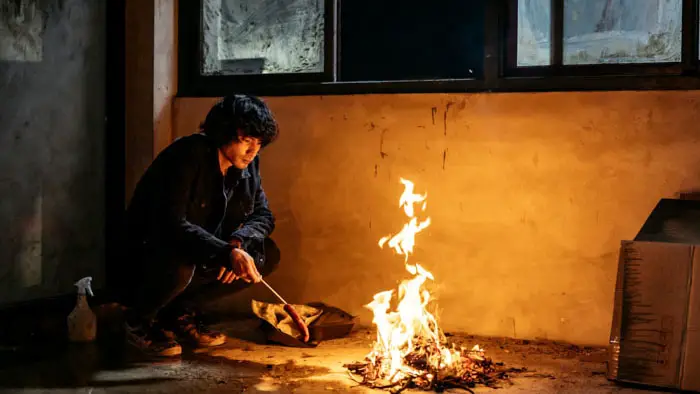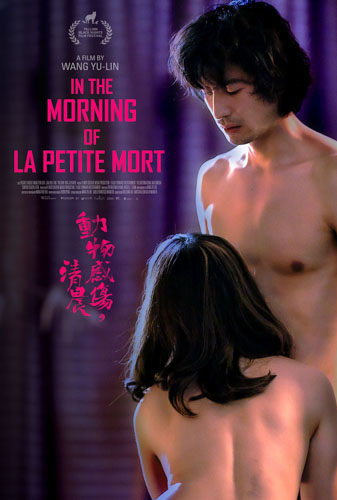
NOW ON VOD! Different cultures tell their stories differently. Yu-Lin Wang’s dramatic feature, In the Morning of La Petit Mort (Dong Wu Gan Shang De Qing Chen), is the story of four lost souls told like a painting than a traditional Western narrative.
Matsui (Yusuke Fukuchi) is a food delivery driver who lives on the street and occasionally finds shelter in a rundown office building. Ching (Wang Yun-Chih) is a beautiful prostitute who survives day-to-day sleeping with clients in her apartment.
Helen (Huei-Ling Jan) is a middle-aged cleaning woman from the Philippines. Her low wages are not enough to survive, so she resorts to dumpster diving and eating anything her clients throw in the trash. Lastly, Wang (Jieh-Wen King) is a creepy security guard who works at the apartment Helen regularly cleans. He is constantly hitting on her for sex, but she is not that desperate.
Fundamentally, In the Morning of La Petit Mort is about making connections. Matsui regularly delivers meals to Ching, and one day, he asks her how much she charges for an hour. When the two have sex, the homeless Matsui begins to break down in tears as this encounter is the closest he’s ever been with a woman since moving to the street.
Also feeling connected with Matsui, Ching refuses his payment and tells him that his next several deliveries would not only pay for the night but ensure he returns.

“Matsui regularly delivers meals to Ching, and one day, he asks her how much she charges for an hour.”
For Helen, she is an immigrant with no connections in Taiwan. She secretly pines for Matsui’s friendship and affection, but his infatuation with Ching keeps him at arm’s length from Helen.
As time passes, Matsui is able to find better work for better pay and confides in Matsui about his dreams. Everything is going well until Ching suddenly disappears. Unbeknownst to Matsui, Ching is pregnant, and the father could be anyone. Of course, Matsui falls into a deep depression.
I mentioned at the start that In the Morning of La Petit Mort is more like a painting than a traditional narrative. First, there is very little dialogue. Each person’s character arc is told by their constantly evolving emotional state. If you live in a city with a severe homeless problem, director Wang captures the feeling of not being connected to anyone or anything. He then captures the desperation of making a connection.
The other element of the “painting” can be described by Wang’s themes behind his storytelling. He states, “The four characters are modeled on the four Chinese Five Elements, fire, water, wood, and metal, that generate and overcome interaction with each other.”
He goes on to describe Matsui as fire, representing homelessness and isolation. Ching’s water makes her adaptable to her surroundings by using her body to survive and adapt to the birth of her baby girl. Like wood, the immigrant Helen drifts like a migrant from one homeland to another. The arrogant and stubborn Wang is metal.
In the Morning of La Petit, Mort is a very different way to tell a story and may not be for everyone. You can tell by the poster that this story is intense and, yes, erotic as well. If you’re not familiar with East Asian storytelling, you’ll need to work at following the stories. But if you see the elements of this living painting, you’ll be in for an expected treat.

"…more like a painting than a traditional narrative."


